105 books about Judges and 5
start with T
105 books about Judges and 5
105 books about Judges
5 start with T start with T
5 start with T start with T
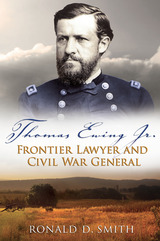
Thomas Ewing Jr.
Frontier Lawyer and Civil War General
Ronald D. Smith
University of Missouri Press, 2008
An Ohio family with roots in the South, the Ewings influenced the course of the Midwest for more than fifty years. Patriarch Thomas Ewing, a former Whig senator and cabinet member who made his fortune as a real estate lawyer, raised four major players in the nation’s history—including William Tecumseh “Cump” Sherman, taken into the family as a nine-year-old, who went on to marry his foster sister Ellen. Ronald D. Smith now tells of this extraordinary clan that played a role on the national stage through the illustrious career of one of its sons.
In Thomas Ewing Jr.: Frontier Lawyer and Civil War General, Smith introduces us to the Ewing family, little known except among scholars of Sherman, to show that Tom Jr. had a remarkable career of his own: first as a real estate lawyer, judge, soldier, and speculator in Kansas, then as a key figure in national politics. Smith takes readers back to Bleeding Kansas, with its border ruffians and land speculators, reconstructing the rough-and-tumble of its courtrooms to demonstrate that its turmoil was as much about claim-jumping as about slavery. He describes the seat-of-the-pants law practice in which Ewing worked with his brothers Hugh and Charlie and foster brother Cump. He then tells how Tom came to national prominence in the fight over the proslavery Lecompton Constitution, was instrumental in starting up the Union Pacific Railroad, and became the first chief justice of the Kansas Supreme Court.
Ewing obtained a commission in the Union Army—as did his brothers—and raised a regiment that saw significant action in Arkansas and Missouri. After William Quantrill’s raid on Lawrence, Kansas, he issued the dramatic General Order No. 11 that expelled residents from sections of western Missouri. Then this confidant of Abraham Lincoln’s went on to courageously defend three of the assassination conspirators—including the disingenuous Samuel Mudd—and lobbied the key vote to block the impeachment of Andrew Johnson.
Smith examines Ewing’s life in meticulous detail, mining family correspondence for informative quotes and digging deep into legal records to portray lawmaking on the frontier. And while Sherman has been the focus of most previous work on the Ewings, this book fills the gaps in an interlocking family of remarkable people—one that helped shape a nation’s development in its courtrooms and business suites. Thomas Ewing Jr.: Frontier Lawyer and Civil War General retells a chapter of Kansas history and opens up a panoramic view of antebellum America, the Civil War, Reconstruction, and the Gilded Age.
[more]
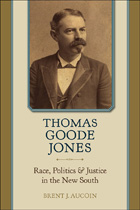
Thomas Goode Jones
Race, Politics, and Justice in the New South
Brent J. Aucoin
University of Alabama Press, 2016
This first comprehensive biography of Thomas Goode Jones records the life of a man whose political career reflects the fascinating and unsettled history of Alabama and the Deep South at the turn of the twentieth century.
Often overshadowed by the pharaonic antebellum period, the Civil War, and the luminous heights of the civil rights movement, the deceptively placid decades at the turn of the century were, in fact, a period when southerners fiercely debated the course of the South’s future. In tracing Jones’s career, Brent J. Aucoin offers vivid accounts of the great events and trends of that pivotal period: Reconstruction, the birth of the “Solid South,” the Populist Revolt, and the establishment of racial disenfranchisement and segregation.
Born in 1844, Jones served in the Confederate army and after the war identified as a conservative “Bourbon” Democrat. He served as Alabama's governor from 1890 to 1894 and as a federal judge from 1901 until his death in 1914. As a veteran, politician, and judge, Jones embodied numerous roles in the shifting political landscape of the South.
Jones was not, however, a reflexive conformist and sometimes pursued policies at odds with his party. Jones’s rhetoric and support of African American civil rights were exceptional and earned him truculent criticism from unrepentant racist factions in his party. His support was so fearless that it inspired Booker T. Washington to recommend Jones to Republican president Theodore Roosevelt as a federal judge. On the bench, Jones garnered national attention for his efforts to end peonage and lynching, and yet he also enabled the establishment of legalized segregation in Alabama, confounding attempts easily to categorize him as an odious reactionary or fearless progressive.
A man who both represented and differed from his class, Thomas Goode Jones offers contemporary readers and scholars an ideal subject of study to understand a period of southern history that still shapes American life today.
Often overshadowed by the pharaonic antebellum period, the Civil War, and the luminous heights of the civil rights movement, the deceptively placid decades at the turn of the century were, in fact, a period when southerners fiercely debated the course of the South’s future. In tracing Jones’s career, Brent J. Aucoin offers vivid accounts of the great events and trends of that pivotal period: Reconstruction, the birth of the “Solid South,” the Populist Revolt, and the establishment of racial disenfranchisement and segregation.
Born in 1844, Jones served in the Confederate army and after the war identified as a conservative “Bourbon” Democrat. He served as Alabama's governor from 1890 to 1894 and as a federal judge from 1901 until his death in 1914. As a veteran, politician, and judge, Jones embodied numerous roles in the shifting political landscape of the South.
Jones was not, however, a reflexive conformist and sometimes pursued policies at odds with his party. Jones’s rhetoric and support of African American civil rights were exceptional and earned him truculent criticism from unrepentant racist factions in his party. His support was so fearless that it inspired Booker T. Washington to recommend Jones to Republican president Theodore Roosevelt as a federal judge. On the bench, Jones garnered national attention for his efforts to end peonage and lynching, and yet he also enabled the establishment of legalized segregation in Alabama, confounding attempts easily to categorize him as an odious reactionary or fearless progressive.
A man who both represented and differed from his class, Thomas Goode Jones offers contemporary readers and scholars an ideal subject of study to understand a period of southern history that still shapes American life today.
[more]
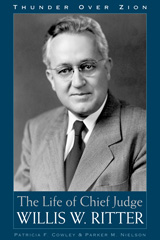
Thunder Over Zion
The Life and Times of Chief Judge Willis W Ritter
Cowley & Nielson
University of Utah Press, 2006
Willis William Ritter, United States District Judge for the District of Utah from 1949 until his death on March 4, 1978, was the one judge whose name was familiar among those who had little or no idea of the difference between judicial jurisdictions. Many knew him by the broad gestures with which he challenged bureaucracies and the federal government itself. He was, legally speaking, a friend to the underdog. Yet at his death scarcely a friend was left and he had become the object of ridicule, outrage, pity, and contempt.
Ritter was clearly ahead of his time, for his opinions on criminal justice, police interrogation, and the rights to counsel have now become accepted standards in jurisprudence. They are, indeed, so universally accepted that few if any viewers of televised police court dramas would even question them. In his personal life he was a man flawed on a grand scale and he lived a life fraught with contradictions. This is his compelling story, compellingly recounted.
[more]
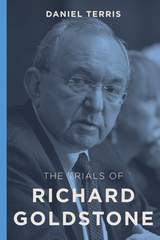
The Trials of Richard Goldstone
Terris, Daniel
Rutgers University Press, 2019
In June 2009, Richard Goldstone was a global hero, honored by the MacArthur Foundation for its prize in international justice. Four months later, he was called a “quisling” and compared to some of the worst traitors in human history. Why? Because this champion of human rights and international law chose to apply his commitments to fairness and truth to his own community.
The Trials of Richard Goldstone tells the story of this extraordinary individual and the price he paid for his convictions. It describes how Goldstone, working as a judge in apartheid South Africa, helped to undermine this unjust system and later, at Nelson Mandela’s request, led a commission that investigated cases of racial violence and intimidation. It also considers the international renown he received as the chief United Nations prosecutor for war crimes committed in Rwanda and the former Yugoslavia, the first tribunals to try political and military leaders on charges of genocide. Finally, it explores how Goldstone became a controversial figure in the wake of the Jewish jurist’s powerful, but flawed, investigation of Israel for alleged war crimes in Gaza.
Richard Goldstone’s dramatic life story reveals that even in a world rife with prejudice, nationalism, and contempt for human rights, one courageous man can advance the cause of justice.
The Trials of Richard Goldstone tells the story of this extraordinary individual and the price he paid for his convictions. It describes how Goldstone, working as a judge in apartheid South Africa, helped to undermine this unjust system and later, at Nelson Mandela’s request, led a commission that investigated cases of racial violence and intimidation. It also considers the international renown he received as the chief United Nations prosecutor for war crimes committed in Rwanda and the former Yugoslavia, the first tribunals to try political and military leaders on charges of genocide. Finally, it explores how Goldstone became a controversial figure in the wake of the Jewish jurist’s powerful, but flawed, investigation of Israel for alleged war crimes in Gaza.
Richard Goldstone’s dramatic life story reveals that even in a world rife with prejudice, nationalism, and contempt for human rights, one courageous man can advance the cause of justice.
[more]
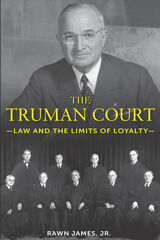
The Truman Court
Law and the Limits of Loyalty
Rawn James
University of Missouri Press, 2021
Perhaps the most overlooked aspect of Harry S. Truman’s presidency is his judicial legacy, with even the finest of Truman biographies neglecting to consider the influence he had on the Supreme Court. Yet, as Rawn James lays out in engaging detail, president Harry Truman successfully molded the high court into a judicial body that appeared to actively support his administration’s political agenda. In rulings that sparked controversy in their own time, the Supreme Court repeatedly upheld Truman’s most contentious policies, including actions to restrict free speech, expand civil rights, and manage labor union unrest.
The Truman Court: Law and the Limits of Loyalty argues that the years between FDR’s death in 1945 and Chief Justice Earl Warren’s confirmation in 1953—the dawn of the Cold War—were, contrary to widespread belief, important years in Supreme Court history. Never before or since has a president so quickly and completely changed the ideological and temperamental composition of the Court. With remarkable swiftness and certainty, Truman constructed a Court on which he relied to lend constitutional credence to his political agenda.
The Truman Court: Law and the Limits of Loyalty argues that the years between FDR’s death in 1945 and Chief Justice Earl Warren’s confirmation in 1953—the dawn of the Cold War—were, contrary to widespread belief, important years in Supreme Court history. Never before or since has a president so quickly and completely changed the ideological and temperamental composition of the Court. With remarkable swiftness and certainty, Truman constructed a Court on which he relied to lend constitutional credence to his political agenda.
[more]
READERS
Browse our collection.
PUBLISHERS
See BiblioVault's publisher services.
STUDENT SERVICES
Files for college accessibility offices.
UChicago Accessibility Resources
home | accessibility | search | about | contact us
BiblioVault ® 2001 - 2024
The University of Chicago Press









